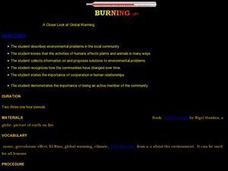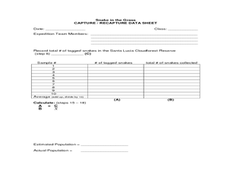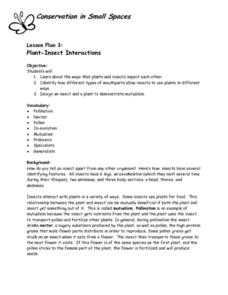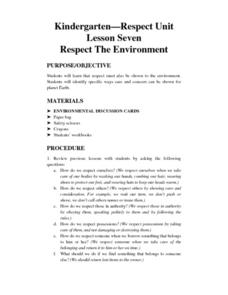Curated OER
Burning Up! A Look at Global Warming
Students investigate global warming. In this global warming lesson, students watch movies about global warming, discuss problems in their local community and see how communities have changed over time. Students realize the importance of...
Curated OER
Fossil Fuels (Part III), The Geology of Coal
Do not overlook this set of lessons just because your school does not have a data analysis system. There is plenty of material here to administer a complete mini unit on the formation, distribution, and properties of coal. Since it...
Captain Planet Foundation
Fall into Healthy Shapes
Kindergartners identify geometric shapes by planting a fall garden. They start their seeds in containers that have different shapes, and keep track of their plants based on those shapes. This brilliantly designed and incredibly thorough...
Chicago Botanic Garden
Historical Climate Cycles
What better way to make predictions about future weather and climate patterns than with actual climate data from the past? Young climatologists analyze data from 400,000 to 10,000 years ago to determine if climate has changed over time....
Curated OER
Snake in the Grass: Capture/Recapture Activity
Learners estimate the total number of species in Ecuador using the capture/recapture method. They collect data about each species and act as members of a science expedition to determine the total number of species by using mathematical...
Curated OER
Conservation in Small Spaces: Plant-Insect Interactions
Students explore ways that plants and insects impact each other, identify how different types of mouthparts allow insects to use plants in different ways, and design an insect and a plant to demonstrate mutualism.
Institute for Energy and Environmental Research
Practice with Scientific Notation
Zeroes are more important than they look! A guided practice activity takes learners through the process of both scientific and decimal notation, culminating in more complex word problems and equations.
Curated OER
Land Use and Lawmaking in California
Students read writings by Ralph Waldo Emerson to analyze transcendentalism and analyze photographic essays depicting environmental issues. For this art and history lesson, students read excerpts of Nature by Emerson to identify...
Curated OER
Hula Hoop Habitats
Students explore migration. In this science lesson, students play a game in which they explore bird migration. Students discuss the needs of birds and play a game in which they "migrate" in order to meet their needs.
Curated OER
Search a Word
Students review vocabulary associated with solid waste management. They complete a word search to familiarize themselves with the options of solid waste management including varying costs and environmental impacts.
Curated OER
Trail Construction
Students explore environmental care by participating in a trail building exercise. In this topography lesson, students collaborate in small groups and utilize building materials to create a trail in a nearby park or nature area. Students...
Curated OER
The New Explorers: Environmental Swat Team
Learners follow scientists into the dry forest of Bolivia as they track and record the different species of mammals, birds, insects and plants that would be lost if the forests disappear.
Green Education Foundation
How Loud is Too Loud?
Ever wonder how loud a sound has to be to cause damage? Young scientists explore sound properties by researching decibel levels. They discuss how sound is perceived by our ears and our brains and why it can cause negative health effects...
Population Connection
The Carbon Crunch
Carbon is in the air; should we care? Teach the class why it is important to pay attention to carbon levels and how the world population and various countries across the globe affect the carbon levels in the atmosphere. High schoolers...
Curated OER
Readings in Hudson River Natural History
Reading and understanding informational text is a key element to understanding every discipline. Elementary learners read three different articles focused on various animals and habitats in the Hudson River. They answer comprehension...
National Library of Medicine
Your Environment, Your Health: The Great Debate—Bottled Water vs. Tap Water in Our School
Should bottled water be sold in schools, or should they only provide tap water? The summative unit in the six-part series encourages scholars debating this topic. The lessons teach how to build an argument, how to gain background...
Science Education Resource Center
Compare and Contrast deciduous and evergreen tree leaves to aid in tree identification
Boost observational skills and get to know the difference between deciduous, coniferous, and evergreen trees with a lesson that challenges scholars to compare, contrast, identify, sort, and draw their findings.
Cold Spring Harbor Laboratory
Mendelian Genetics Cannot Fully Explain Human Health and Behavior
The breakthrough of Mendelian genetics solved many puzzles for biologists. Then, scientists decided to apply the theory to human behavior. Learn the story and struggle of finding a genetic explanation for hobbies, interests, and mental...
Cold Spring Harbor Laboratory
Some Types of Mutations Are Automatically Repaired
Does natural light damage or repair DNA? Learn the answer discover the scientists who researched the topic with an online interactive. Scholars read through an online animation presenting the content at their own pace. Then, they read...
Curated OER
The Chesapeake Bay in Captain John Smith's Time
When Captain John Smith visited the Chesapeake Bay in the summer of 1608, what types of animals and habitats did he encounter? Your young historians will analyze primary source documents to answer this question, as well as compare the...
Curated OER
Treasure Hunters
Students design an on campus treasure hunt to find various architectural vocabulary words which they then create definitions for on the blog page on the Environmental Design website.
Curated OER
Making a Human Tree
Students explore botany by defining the anatomy of a tree. In this environmental exploration activity, students research plant vocabulary terms and discuss the uses of each word. Students create a "human" tree by role-playing as one of...
Curated OER
Energy Conservation Lesson 1: Fossil Fuels and the Ticking Clock
Pupils explore energy production by participating in a class discussion. In this renewable energy lesson plan, students discuss the differences between solar, coal, wind and fossil fuel energy sources and why some are better for the...
Curated OER
Kindergarten-Respect Unit (Lesson Seven) Respect The Environment
Students review the concept of respect and that they should respect, not only themselves, but those around them. They comment on some example pictures in which the environment is NOT being respected and decide what should have been done...
Other popular searches
- Environmental Science Games
- Environmental Science Unit
- Ap Environmental Science
- Environmental Science Energy
- Environmental Science Maps
- Environmental Science Debate
- Environmental Science Water
- What Is Environmental Science
- Environmental Science Projects
- Environmental Science Graphing
- Life and Environmental Science
- Environmental Science Rift

























